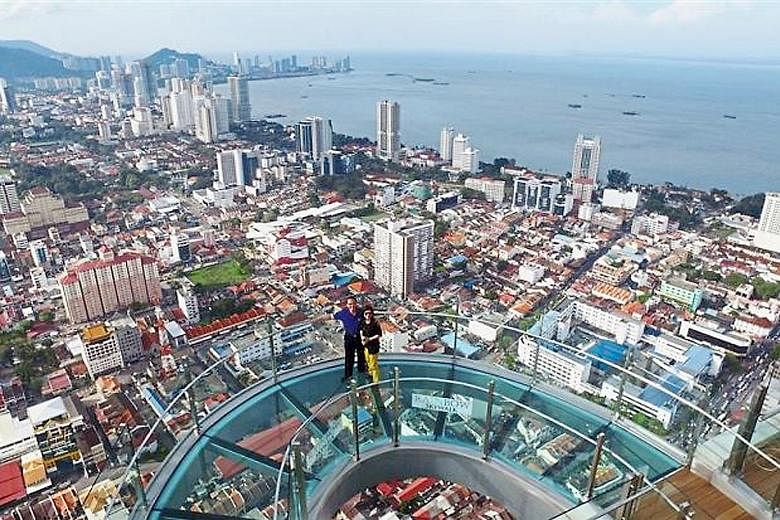Penang Chief Minister Lim Guan Eng faces a graft trial, the threat of deregistration of his party and accusations that his administration is anti-Malay-Muslims, who form the ethnic majority in both the state and Malaysia.
But what gets his goat is the seemingly trivial matter of upgrading the island's airport - which busted its annual capacity of 6.5 million passengers last year - four years earlier than expected.
"They are playing politics and want to make life difficult for Penang," the Democratic Action Party (DAP) secretary-general told The Straits Times in an interview last week, pointing the finger at the federal government.
The Najib administration insists that an airport expansion to accommodate 10 million passengers is needed only by 2025.
Such divergent views often surface between Putrajaya and Penang. It is among only three of Malaysia's 13 states not controlled by the ruling coalition, Barisan Nasional (BN).
Both sides are now using Penang's fortunes as campaign fodder for a general election due in a year.
International media has zoomed in on how Penang has become a model and showcase for the opposition's claim that it can bring "competency, accountability and transparency (CAT)" to governance. Penang is often dubbed Malaysia's Silicon Valley because of the many global electronics names with plants here. Among the 13 states, it attracted the most investments for 2010 and 2011, even though it is the second-smallest in size after Perlis.
But the ruling coalition insists Penang isn't doing as well as it claims.
BN says the state's economy has grown slower than the national average since Mr Lim's DAP, the largest party in the opposition Pakatan Harapan pact, took control.
BN strategic communications director Abdul Rahman Dahlan claimed this month that Mr Lim's administration has sold or traded away RM37 billion (S$12 billion) in land and assets to fund fiscal spending that is five times higher than the last budget tabled by his predecessor.
"Guan Eng should admit that his CAT policy was unsuccessful," said Datuk Seri Rahman, who is also Economic Planning Minister. "Instead of efficiency... I am very sure Penangites agree with me that selling or trading away state assets... is a sign of bad governance."
DAP's response is that it has reversed a downward economic slide under BN - with Penang's GDP per capita growth improving from being the lowest in Malaysia in 2007 at 5.9 per cent (well below the national average of 7.4 per cent) to being the highest in 2015 at 6.4 per cent (nearly twice the 3.3 per cent recorded by the country).
Mr Lim said that, despite tabling deficit budgets each year, it has always eventually recorded a surplus, leading to reserves of RM1.8 billion, the highest in the state's history.
He also insists the increase is revenue not primarily from asset sales, but from land premiums paid by developers converting agricultural and residential land to industrial and commercial use as "everyone wants to develop Penang. There is a hunger and thirst for new projects".
Mr Lim has also been attacked for allegedly paying a company high consultancy fees - of RM209 million - for an infrastructure project that has yet to be built.
This is just the latest BN claim of abuse of power against him.
He is also facing trial for allegedly receiving a discount on a RM2.8 million bungalow in exchange for granting land re-zoning approval.
His party has been threatened with deregistration by the Registrar of Societies after being accused of twice fixing DAP internal leadership polls to ensure that those loyal to him were elected.
Whatever the conclusion of those cases might be, not everyone is happy with the pace of development in the state.
Umno, whose Malay-majority vote bank is crucial to BN retaining power, has constantly played up the loss of Malay villages to new developments, although Penang has said they must be compensated fairly.
Even Mr Lim admits that state capital George Town, now a huge tourist attraction after becoming a Unesco World Heritage Site in 2008, suffers from gentrification and that, as the value of property there rises, so does the cost of living.
"There is a tension," said documenter and archivist Goh Choon Ean. "There are the people who can afford to stay... but those who can't, they get evicted, or forced out."
His interviews with landlords, tenants and heritage workers are currently being exhibited as part of the George Town Festival, Penang's main arts and culture event.
"Maybe five years down the road, we might all move to Butterworth on the mainland or somewhere further where the land is cheaper," said food and beverage entrepreneur Tan Wei Ming, a local who feels pushed out of George Town because of prohibitive rentals.

